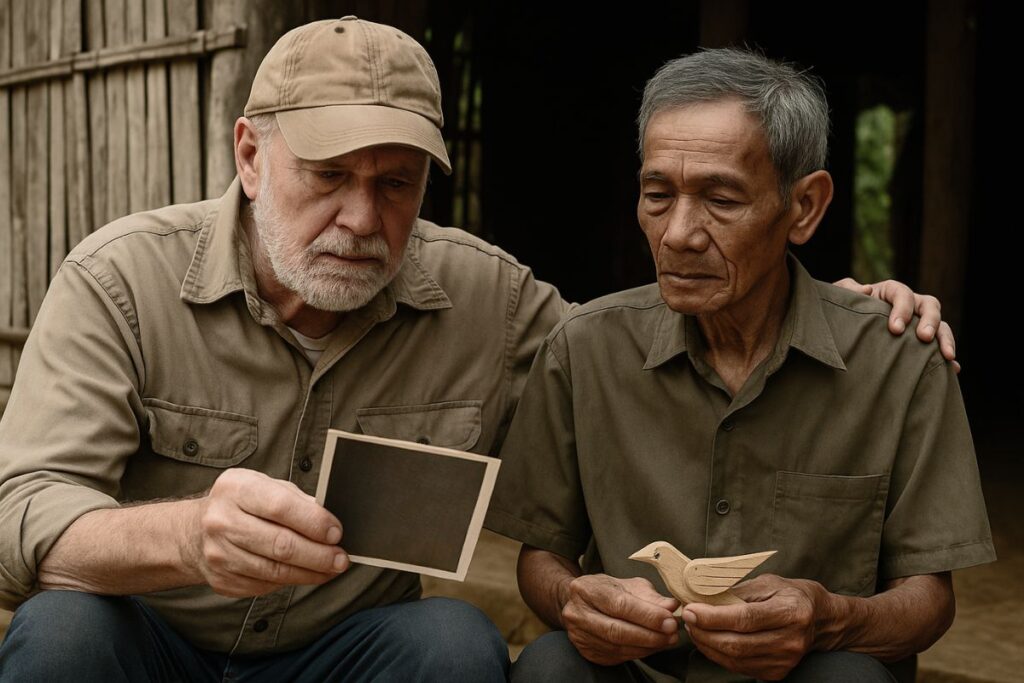Part 7
Đắk Tô Highlands, Vietnam — 1972, Weeks After the Escape
Minh woke up to the sound of chickens scratching outside the window and the faint ache in his side.
He was alive.
The last thing he remembered was the river — cold water, Jack’s hands holding him, then sky.
Now, he lay on a thin mattress in a Laotian village, bandaged, bruised, and full of questions.
The American had vanished.
The elder woman tending to Minh spoke no Vietnamese. She smiled often, pointed at his chest when she changed his dressings, said words he didn’t understand.
Each day, he tried to stand. And each day, his body refused.
But the boy who had dragged an enemy pilot through the jungle was no stranger to pain.
He would rise again.
On the fifth morning, a man with a cross around his neck arrived. The villagers called him “Father Jean.” He spoke a little Vietnamese, broken but kind.
“You are safe,” he told Minh. “Your friend — he is gone now. Back to America.”
Minh didn’t answer.
Jean sat beside him, hands folded. “He left this.”
A folded piece of paper. Minh opened it.
Inside — Jack’s handwriting, shaky but strong. Words he couldn’t read.
Jean translated slowly.
“To the boy who saved me…”
Minh listened, face stone-still. But his throat burned.
The weeks passed. Minh recovered enough to walk. He helped mend baskets, split wood, carry water. Quiet work. The kind that kept his thoughts from drowning him.
But nothing dulled the shame that came when he thought of his village — the neighbors who never returned after the bombs, the brother buried without a grave.
Had they known what he had done?
That he had carried an American to safety?
He never went home.
Instead, Minh moved south — to a quiet valley far from memory. He built a hut with his own hands. Grew rice. Took in a widow who had lost her husband in the same war. Together, they had two sons.
Minh told her everything.
She said nothing.
But she never looked at him like a traitor.
Only like a man who had survived.
For decades, he kept the baby photo — the one from Jack’s flight suit — inside a clay jar by his bed. On nights when the jungle winds howled and ghosts came knocking, Minh would light a candle and stare at that tiny face.
She had eyes like forgiveness.
In 1991, after the embargo eased, travelers began to return. Tourists with cameras and books. Volunteers with medicine and English.
Minh stayed out of sight. He trusted few.
But in his fields, he carved birds from bamboo. Dozens of them. Some he gave to children. Others he burned in silence.
Then one day, a man came asking questions. Showing a photo of a smiling pilot. Asking if anyone had heard of a boy who saved him.
Minh turned away.
He wasn’t ready.
Not yet.
When Jack finally arrived in 2002, Minh saw him from the edge of the rice fields before the children even called out.
He looked older. Smaller. Not like the giant in uniform Minh remembered.
But the moment their eyes met, the years collapsed like dry leaves.
Minh didn’t need a translator to know what Jack had come to say.
He already knew.
That night, Minh carved one more bird — smooth and white, no rough edges.
As he worked, he whispered a name he had never said aloud in thirty years.
“Jack.”
Not enemy.
Not soldier.
Just Jack.


